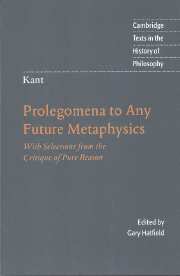Book contents
- Frontmatter
- Contents
- Acknowledgments
- Introduction
- Chronology
- Further reading
- Note on texts and translation
- Prolegomena to Any Future Metaphysics
- Table of Contents
- Preface
- Preamble
- General Question of the Prolegomena
- General Question
- The Main Transcendental Question, First Part
- The Main Transcendental Question, Second Part
- The Main Transcendental Question, Third Part
- Solution to the General Question of the Prolegomena
- Appendix
- Selections from the Critique of Pure Reason
- Index
- Cambridge texts in the history of philosophy
The Main Transcendental Question, Second Part
Published online by Cambridge University Press: 05 June 2012
- Frontmatter
- Contents
- Acknowledgments
- Introduction
- Chronology
- Further reading
- Note on texts and translation
- Prolegomena to Any Future Metaphysics
- Table of Contents
- Preface
- Preamble
- General Question of the Prolegomena
- General Question
- The Main Transcendental Question, First Part
- The Main Transcendental Question, Second Part
- The Main Transcendental Question, Third Part
- Solution to the General Question of the Prolegomena
- Appendix
- Selections from the Critique of Pure Reason
- Index
- Cambridge texts in the history of philosophy
Summary
Nature is the existence of things, insofar as that existence is determined according to universal laws. If nature meant the existence of things in themselves, we would never be able to cognize it, either a priori or a posteriori. Not a priori, for how are we to know what is suited to things in themselves, since this can never come about through the analysis of our concepts (analytical propositions), since I do not want to know what may be contained in my concept of a thing (for that belongs to its logical being), but what would be added to this concept in the actuality of a thing and through which the thing itself would be determined in its existence apart from my concept. My understanding, and the conditions under which alone it can connect the determinations of things in their existence, prescribes no rule to the things themselves; these do not conform to my understanding, but my understanding would have to conform to them; they would therefore have to be given to me in advance so that these determinations could be taken from them, but then they would not be cognized a priori.
Such cognition of the nature of things in themselves would also be impossible a posteriori. For if experience is supposed to teach me laws to which the existence of things is subject, then these laws, insofar as they relate to things in themselves, would have to apply to them necessarily even apart from my experience.
- Type
- Chapter
- Information
- Kant: Prolegomena to Any Future MetaphysicsWith Selections from the Critique of Pure Reason, pp. 47 - 80Publisher: Cambridge University PressPrint publication year: 1997



